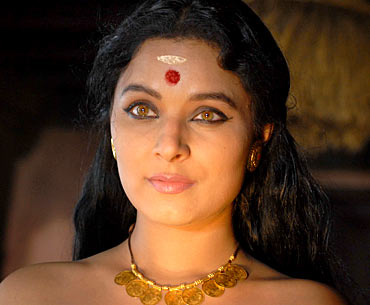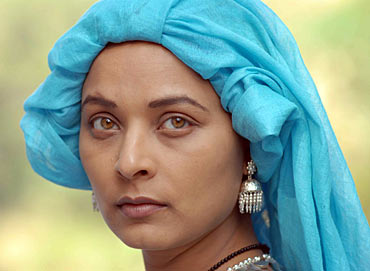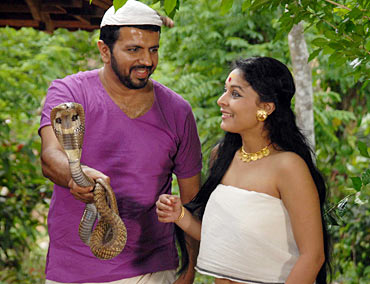
Priyanandanan's Malayalam film Sufi Paranja Katha (What the Sufi said), which releases on February 19, focuses mainly on the life of a character named Karthi.
Actor Sharbani Mukherjee, who starred in Hindi films like Border and in director Priyadarsan's Malayalam film Rakkilippattu, plays the lead role in the period drama.
The film revolves around Karthi's tumultuous life after eloping with a Muslim trader (Mammootty) and her conversion to Islam.
Sharbani sheds more light on her character in an interview with rediff.com.
What attracted you towards the role of Karthi?
When I was approached for the film, I decided to read the novel by K P Ramananunni first. I really loved the story and its peculiar style. I loved the way my character Karthi was portrayed and especially the transition that she faces in her life.
There are also various other reasons why I did this film. One is Priyanandanan, who is a brilliant director. Also, Sufi Paranja Katha is being marketed to an international audience.

What is the nature of your character, Karthi?
It's a phenomenal character who is bold and complex. At the same time, it brings across a very strong social message. Her relations with different people especially with Sanku mama (a karanavar of the Meleppullara tharavadu) as well as with Mammootty are different but strong in their own way. Her relationship with Sanku Mama will leave the audience perplexed as what she is sharing with him is innocent yet different.
Then she meets Mammootty, a man who makes her feel like a woman. It's perhaps unthinkable for any girl, especially during that period, to elope with a man from a different caste, give up her faith and transform into somebody else. There are more dimensions to the character.
How tough was it being part of a period film?
The makers of the film had done their research. Though I'm not fully aware of several aspects, they are quite clear about the state of things during that time.
I surrendered completely to their perception of my character. That makes things a lot easier for me as well. Like water, I just went with the flow. I thoroughly enjoyed working with the unit. Initially there were problems with the language, but I think cinema is a universal medium.

Did you feel like a Malayali while playing the character?
(Smiles) I felt completely like a Malayali. When I was facing the camera, it was Karthi and not me. I have tried to learn the language. Actors at times tend to speak the lines just for the heck of it, but I didn't want to do that. I believe that when you are acting in a particular language, you should treat the language with respect and try to learn it.
Since Border we haven't seen much of you in Hindi films. Why is that?
I come from a film-based background and on a personal level I am on the lookout for good roles rather than run after just about anything. I have always been conscious about doing quality work. I don't want to get pigeon holed or overextend myself. Most of today's directors are willing to experiment with new kinds of subjects which are a lot more interesting. I guess you will get to see more of me from now on.
Are you planning to do more films in Malayalam?
I would love to do more films in Malayalam. I feel that the language is often associated with good cinema. It has been wonderful playing Karthi. As an actor, I feel my best is yet to come.